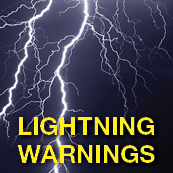Florida is the lightning capital of the United States, and our region experienced an active storm season last year. Please note that all severe weather alerts are made available to the NSU community via the NSU Emergency Web page, and the NSU Hurricane Web page.
Effective Wednesday, June 26, the university will begin to broadcast “Lightning Warning” and “Lightning Warning-All Clear” messages on the main campus, utilizing the public address giant voice speakers on NSU athletic fields, as well as over a strategic number of Blue Light Emergency phones and SharkTube video displays on main campus and Rolling Hills.
Please take the time to review the Personal Lightning Safety Tips below:
Personal Lightning Safety Tips
1. PLAN in advance your evacuation and safety measures. When you first see lightning or hear thunder, activate your emergency plan. Now is the time to go to a building or a vehicle. Lightning often precedes rain, so don’t wait for the rain to begin before suspending activities.
2. IF OUTDOORS… Avoid water. Avoid the high ground. Avoid open spaces. Avoid all metal objects including electric wires, fences, machinery, motors, power tools, etc. Unsafe places include underneath canopies, small picnic or rain shelters, or near trees. Where possible, find shelter in a substantial building or in a full enclosed metal vehicle such as a car, truck or van with the windows completely shut. If lightning is striking nearby when you are outside, you should:
- Crouch down. Put feet together. Place hands over ears to minimize hearing damage from thunder.
- Avoid proximity (minimum of 15 ft.) to other people.
- IF INDOORS… Avoid water. Stay away from doors and windows. Do not use the telephone. Take off headsets. Turn off, unplug, and stay away from appliances, computers, power tools, and TV sets. Lightning may strike exterior electric and phone lines, inducing shocks to inside equipment.
- SUSPEND ACTIVITIES for 30 minutes after the last observed lightning or thunder.
- INJURED PERSONS do not carry an electrical charge and can be handled safely. Apply First Aid procedures to a lightning victim if you are qualified to do so. Call 9-1-1 or send for help immediately.
- KNOW YOUR EMERGENCY TELEPHONE NUMBERS. CALL 9-1-1 FIRST, then NSU PUBLIC SAFETY at (954) 262-8999
For additional information, please visit www.nova.edu/publicsafety/forms/hurricane_brochure.pdf.

